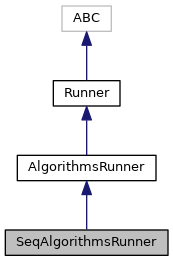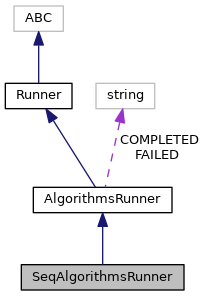|
|
| final_state |
| |
|
| name |
| | The name of this runner instance.
|
| |
|
| input_files |
| | All of the output files made by the collector job and recovered by the "output_patterns".
|
| |
|
| database_chain |
| | User set databases, can be used to apply your own constants and global tags.
|
| |
|
| dependent_databases |
| | List of local databases created by previous CAF calibrations/iterations.
|
| |
|
| output_database_dir |
| | The directory of the local database we use to store algorithm payloads from this execution.
|
| |
|
| results |
| | Algorithm results from each algorithm we execute.
|
| |
|
| algorithms |
| | The list of algorithms that this runner executes.
|
| |
|
| output_dir |
| | Output directory of these algorithms, for logging mostly.
|
| |
|
| string | FAILED = "FAILED" |
| |
|
string | COMPLETED = "COMPLETED" |
| |
Definition at line 93 of file runners.py.
◆ __init__()
| def __init__ |
( |
|
self, |
|
|
|
name |
|
) |
| |
◆ _run_strategy()
| def _run_strategy |
( |
|
strategy, |
|
|
|
iov, |
|
|
|
iteration, |
|
|
|
queue |
|
) |
| |
|
staticprivate |
Runs the AlgorithmStrategy sends back the results
Definition at line 186 of file runners.py.
◆ run() [1/2]
Abstract Base Class for Runner type object.
Definition at line 23 of file runners.py.
◆ run() [2/2]
| def run |
( |
|
self, |
|
|
|
iov, |
|
|
|
iteration |
|
) |
| |
◆ FAILED
Base class for `AlgorithmsRunner` classes. Defines the necessary information that will be provided to every
`AlgorithmsRunner` used by the `framework.CAF`
An `AlgorithmsRunner` will be given a list of `framework.Algorithm` objects defined during the setup of a
`framework.Calibration` instance. The `AlgorithmsRunner` describes how to run each of the `strategies.AlgorithmStrategy`
objects. As an example, assume that a single `framework.Calibration` was given and list of two `framework.Algorithm`
instances to run.
In this example the chosen :py:meth:`AlgorithmsRunner.run()` is simple and just loops over the list of `caf.framework.Algorithm`
calling each one's :py:meth:`caf.strategies.AlgorithmStrategy.run()` methods in order.
Thereby generating a localdb with the only communication between the `strategies.AlgorithmStrategy` instances coming from the
database payloads being available from one algorithm to the next.
But you could imagine a more complex situation. The `AlgorithmsRunner` might take the first `framework.Algorithm` and
call its `AlgorithmStrategy.run` for only the first (exp,run) in the collected data. Then it might not commit the payloads
to a localdb but instead pass some calculated values to the next algorithm to run on the same IoV. Then it might go back
and re-run the first AlgorithmStrategy with new information and commit payloads this time. Then move onto the next IoV.
Hopefully you can see that while the default provided `AlgorithmsRunner` and `AlgorithmStrategy` classes should be good for
most situations, you have lot of freedom to define your own strategy if needed. By following the basic requirements for the
interface to the `framework.CAF` you can easily plugin a different special case, or mix and match a custom class with
default CAF ones.
The run(self) method should be defined for every derived `AlgorithmsRunner`. It will be called once and only once for each
iteration of (collector -> algorithm).
Input files are automatically given via the `framework.Calibration.output_patterns` which constructs
a list of all files in the collector output directories that match the output_patterns. If you have multiple types of
output data it is your job to filter through the input files and assign them correctly.
A list of local database paths are given to the `AlgorithmsRunner` based on the `framework.Calibration` dependencies and
any overall database chain given to the Calibration before running.
By default you can call the "setup_algorithm" transition of the `caf.state_machines.AlgorithmMachine` to automatically
set a database chain based on this list.
But you have freedom to not call this at all in `run`, or to implement a different method to deal with this.
Definition at line 67 of file runners.py.
The documentation for this class was generated from the following file:



